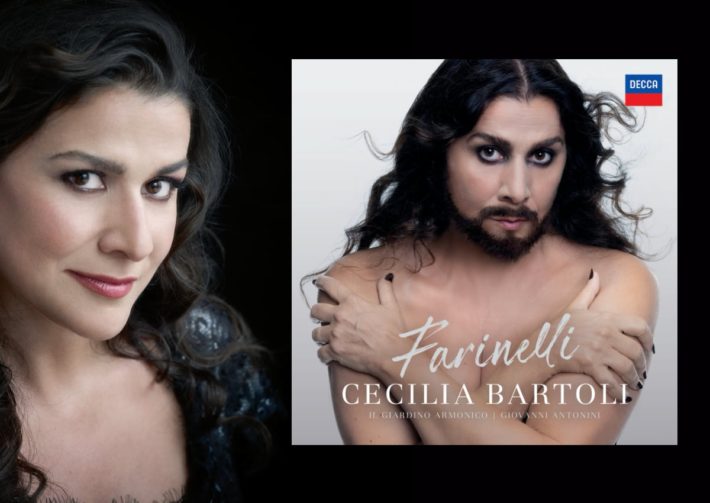Young instrumentalists are often told to sing through their instruments — but what exactly does that mean? Imitating the human voice is certainly one aspect: good vibrato mimics the voice, and various articulation or emotion pairs (like legato/sensual or punctuated/violent) function equally in speech and sonatas. But though most musicians are facile with vibrato and articulation by high school, few of those high schoolers are great musicians. So what’s missing? Enter Cecilia Bartoli, renowned mezzo-soprano. Her new album of Baroque arias written for the famed castrato Farinelli is an operatic tour de force, and makes tangible that otherwise rather abstract notion of “singing”.

The most stunning feature of Bartoli’s performance on this album is her ability to change from aria to aria. Her voice and her performance completely depend on the spirit of the character she’s embodying. In the opening two tracks, she plays two young men, Aci and Imeneo, the first eagerly anticipating his love’s return, the second leisurely admiring his soon-to-be bride. In the first, she drives the music forward with exaggerated consonants (those rolled r’s!) and expert melismas.
She sacrifices the purity of her tone at times, moving to a rather wide vibrato, in order to gain emotive power. In the second, she takes her time, never overstates the text, and actually seems to retreat into her tone in moments (4’10”), singing straight and quietly to create a sense of intimacy. Her choices are consistent with the accompaniment, provided expertly by Il Giardino Armonico and Giovanni Antonini throughout. Under Aci’s bluster, they are full and heavy, while under Imeneo they are delicate and light.
In the third and tenth tracks, Bartoli transforms into a defiant Cleopatra. This is the only woman Bartoli gets to play on the album. She makes a fiery and determined Cleopatra, and as the musical lines rise chromatically, she tricks you into thinking she might lose control, just as Cleopatra seems to be losing control of her own fate. Bartoli never does come entirely unhinged, though, and that’s the magic. In the ninth track, Bartoli is a confused and conflicted Abel, and suddenly her voice is almost boyish and innocent. She narrows and purifies her tone, and sings the aria’s melodic leaps with deceptive nonchalance (“non intendo”).
What allows Bartoli to embody such a variety of personalities? The control of her voice as an instrument is miraculous: she can turn up or down vibrato at will; she can float or charge into her high range with equal success; and her intonation is impeccable even amidst strings of complex vowels and consonants. This means that when she makes an artistic choice, she can execute on it expertly and consistently. What’s more, she’s not afraid to take chances: many may be turned off by her excesses, but better that people feel something than nothing at all. Her ability to conjure entire characters with her voice is one part of what makes her singing so effective.
Another component in Bartoli’s success is her skill at the nebulous art of “phrasing.” Listen to track 4, which has her in duet with the oboe. Her melodies are like streams, fluid and unbroken despite traversing octaves at times. Each note has its correct emphasis, according to the text and the harmony, but none is overlooked. There is no way to calculate these things; Bartoli just feels. And sometimes, as in Aepytus’ aria on track 8, it’s not the consistency of Bartoli’s singing but the variety that makes the music. This is a showpiece, and she doesn’t hold back on the runs, rolled r’s, and rubatos.
Musicians in training take note, opera and Baroque enthusiasts rejoice! Cecilia Bartoli is as wonderful as ever in this album. Highly recommended.
“Farinelli”
Cecilia Bartoli – Mezzo
Il Giardino Armonico
Giovanni Antonini – Conductor
Decca Classics, CD 4850214




















